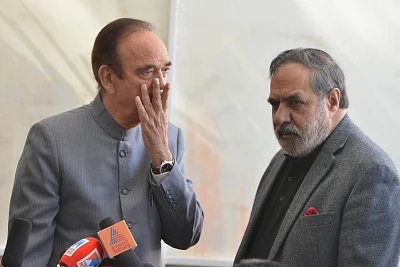Two prominent faces of the Congress' G-23 dissident group – Ghulam Nabi Azad and Anand Sharma – have resigned from key party committees in quick succession.
While Azad resigned as chairman of the Congress' campaign committee in Jammu and Kashmir, Sharma resigned as chairman of the party's steering committee for the upcoming Assembly elections in Himachal Pradesh.
Sharma tweeted that he remains a "lifelong Congressman" but is resigning due to "continued exclusion and insults."
This piece will try to answer three questions:
Why are Azad and Sharma upset?
What do they want?
What impact will their resignations have on the Congress?
Why Are Ghulam Nabi Azad and Anand Sharma Upset?
Azad and Sharma are both extremely senior leaders of the Congress. Both of them began their political careers in Indira Gandhi's era, even before Rajiv Gandhi entered politics. Azad was known to have been close to Sanjay Gandhi.
They have occupied key positions in the party organisation, ministerial berths, and were also the leading figures of the Congress in the Rajya Sabha until recently.
Both have a sense of ownership over the party – Sharma has said in 2020 that they are 'co-owners' of the Congress and not tenants. They also feel that they understand politics better than Sonia Gandhi, Rahul Gandhi, and most of their loyalists.
Azad, for instance, is known to have said during private interactions with leaders that he learnt politics from Sanjay Gandhi and Mufti Mohammad Sayeed and didn't need lessons from others.
Both the leaders feel that they have served the party loyally since decades but have been sidelined ever since Rahul Gandhi's influence in the party began growing.
The non-renewal of their Rajya Sabha terms was the last and most significant blow to them.
What Do Ghulam Nabi Azad and Anand Sharma Want?
The timing of their resignations is connected to the Congress' upcoming organisational elections.
The Congress presently is in a peculiar position. Hardly any leader seems keen to take up the responsibility of becoming party president. But almost every leader desires to be among the key advisors of the party president.
Azad and Sharma are no exception in this regard. Basically, they want a greater say in party affairs once a full-time president takes over.
Both leaders seem to be afraid that if Rahul Gandhi or someone from his camp becomes the party president, it would mean further alienation for them.
To be fair to them, their fear is not just personal alienation but also the prospect of the party being taken in a direction that they don't agree with.
What Impact Will Their Resignations Have?
Probably the only mass leader among the G-23 grouping is former Haryana Chief Minister Bhupinder Singh Hooda. Azad and Sharma are not mass leaders by any stretch. Their resignations are unlikely to have a major impact on the Congress' prospects.
Let's take Sharma, who has resigned as chairman of the screening committee for the Himachal Pradesh elections.
The Congress is facing a leadership vacuum in Himachal Pradesh following the demise of former Chief Minister Virbhadra Singh.
The party has a number of leaders who are popular in their respective areas – Pratibha Singh, wife of Virbhadra Singh in the Shimla region, Mukesh Agnihotri in Una district, Asha Kumari Singh in Dalhousie, Sukhwinder Singh Sukhu in Hamirpur district, Kaul Singh Thakur in Mandi district, and Dhani Ram Shandil in Solan. None of them have state-level appeal.
However, Anand Sharma has neither statewide appeal nor a local base like that of the leaders mentioned above.
Some say his exit may be a good thing for the party as it can now have a new chairman of the screening committee.
The party incharge for Himachal Pradesh, Rajeev Shukla, reached out to Sharma after his resignation and said that he will resolve the matter. However, this seems less due to any political damage that Sharma could cause in Himachal and more as a result of Rajeev Shukla's own efforts to appear as the 'peacemaker' in the party.
Ghulam Nabi Azad's case is a little more complex. A former chief minister of Jammu and Kashmir, he does have his fair share of loyalists in the J&K Congress. Some of his supporters resigned along with him.
At a time when politics in Jammu and Kashmir is in a flux following the ending of its statehood, a rebellion within the Congress led by a former CM could cause some harm to the party.
A lot would depend on what Azad does next. If he remains in the party as a dissident, naturally that damage in the J&K unit will be contained. But if he forms his own party or joins the BJP, it could be more harmful for the Congress.
However, Azad doesn't control the entire state unit. And there will always be space for a national party, especially in the Jammu region. So a complete collapse of the Congress in J&K is unlikely even if Azad leaves.
As of now, Azad and Sharma's resignations and public statements are mainly aimed at earning back some kind of influence in the Congress and avoiding the least desirable outcome for them in the organisational elections.
